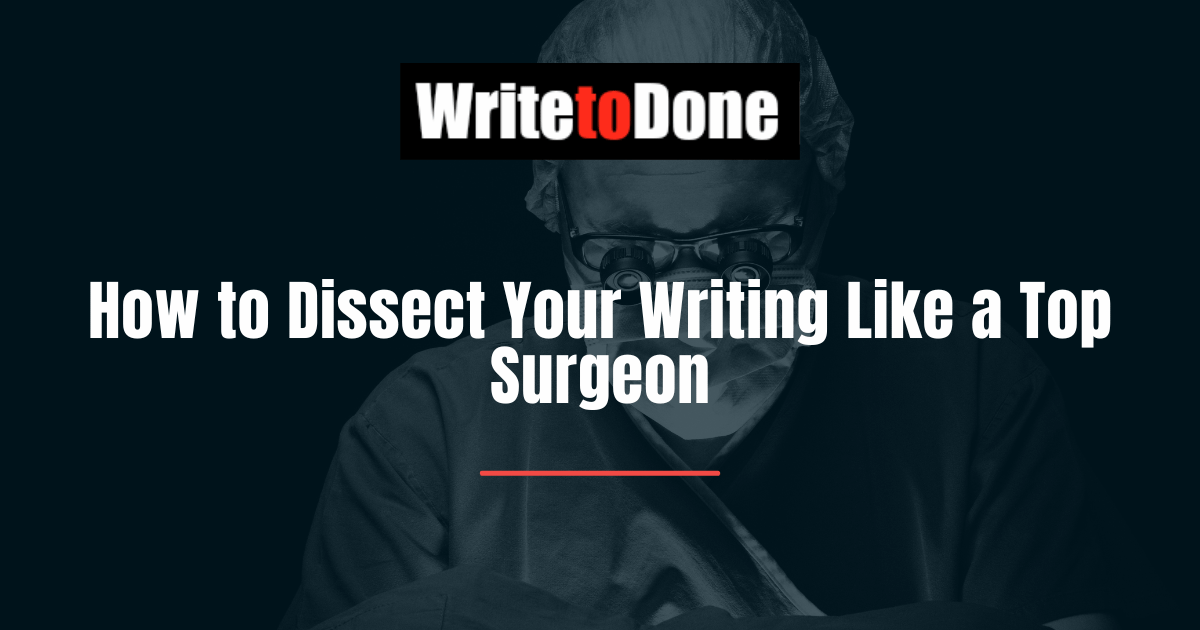Does your writing suffer from wordflab?
Wordflab is the number one enemy of good writing. At least, in the eyes of Sol Stein, the master editor who wrote Stein On Writing.
Yes, folks – we’re back at school with Sol.
This time it’s off to the operating table: We’re going to liposuction wordflab.
Stein says:
Flab-cutting is one of the best means for improving the pace of both fiction and non-fiction. When eliminated, the loss of fat has the welcome side effect of strengthening the body of the remaining text.
Here’s how to operate on wordflab in two steps:
1. Remove all adjectives.
Once you’ve got rid of them, readmit a few after careful testing.
Mark Twain hated adjectives. He wasn’t into surgery. He liked to kill.
If you catch an adjective, kill it!”
The great thing about taking out adjectives is that the resulting text is sleek and the pace quickens.
Here are some examples by Stein. See what happens:
The conspicuous bulge in his pocket had to be a weapon.
‘Conspicuous’ is expendable. The sentence surges ahead without the adjective: “The bulge in his pocket had to be a weapon”?
How about this one?
He was a strong, resourceful warrior.
As Stein points out, the sentence sharpens as soon as you take out one of the adjectives. And the meaning shifts according to which one you leave in.
Now we move to the second surgical procedure:
2. Eliminate dispensable adverbs
Dispensable? Yes, almost all adverbs are dispensable! Remember, adverbs are qualifiers. And many are fillers without substance or function – like ‘very’ or ‘quite’. (Sol suggests using the ‘find’ function to immediately delete every ‘very’ and ‘quite’.)
Delete most adverbs for tight writing, but keep an eye out for two exceptions.
- Adverbs that supply necessary information.
- Adverbs that help the reader visualize the image you want to evoke.
Let’s see how text is transformed through wordflab surgery.
I’m jumping onto the operating table myself to subject my writing to adjective surgery. I’ve chosen a paragraph at random from a post I’m writing for Goodlife Zen. Here it is.
Before the operation:
There are times when it’s natural – and even necessary – to feel low for a while. Maybe you didn’t get the great job you wanted, or lose the one you had. You’re forced to sell your lovely home. Or you lose the person you love. When we suffer a loss – whether it’s the loss of a loved one, our job, our health, or a dream we’ve cherished – it’s quite natural to feel low.
I’m on the table now. It’s scary. The mask is on and I’m counting backwards from ten…nine…eight… [Mary goes under].
After the operation:
I’ve come too and the surgeons have taken off the bandages. This is what the paragraph looks like now:
There are times when it’s natural to feel low: you don’t get the job you want or lose the one you love; you’re forced to sell your home; you lose a loved one; you let go of a dream.
Yes, loss makes us feel low.
It seems tighter. What do you think?
I find it difficult to be objective about my own writing. That’s why I find editing systems, like wordflab surgery, so helpful.
What about you? Do you have the guts to put one of your paragraphs on the operating table and let us see the ‘before’ and ‘after’ in the comment section?
In your haste to rush to the comment section, don’t forget that there’s no school without homework – Sol’s school included.
Sol has left us a puzzle. Your homework is to solve it.
Look at this sentence:
There is nothing I would like better than to meet an interesting person who could become a new friend.
How could it read after wordflab surgery?
PS: Read my complete post-operative post Is Flexible Optimism a Key to Happiness?
Image courtesy of Pixabay
















